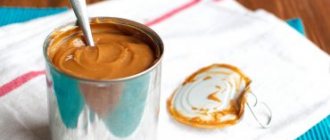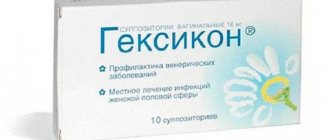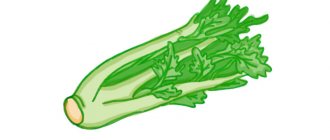Thyme, or thyme, is a low-cost medicinal herb, but it successfully replaces expensive medications. Can nursing mothers take decoctions of this plant?
Photo: depositphotos.com. Author: Syda_Productions.
Found in regions of Russia. The composition depends on the soil and other growing conditions, but in any case the plant is not deprived of beneficial properties.
General healing profile
Thyme contains essential oils (including thymol), tannins, bitterness, gum, and minerals. There are natural organic acids: caffeic, ursolic, oleanolic, quinic.
- The high content of thymol gives thyme strong antibacterial properties, which persist after drying.
- This is an effective remedy for respiratory diseases of bacterial origin. The herb is brewed and drunk for bronchitis and ARVI. The diaphoretic properties of thyme are aimed at combating colds, rhinitis and flu.
- The plant relieves pain during menstruation, intestinal and stomach spasms.
- Taking thyme is indicated for bloating, increased gas formation, and problems with the gastrointestinal tract.
Healing qualities
Thyme (also known as thyme) contains a large amount of microelements and vitamins, essential oils and tannins.
- Manganese promotes the body's production of antioxidant enzymes.
- Iron is involved in the process of hematopoiesis and reduces the risk of developing anemia, which is especially important for women after childbirth who are faced with large blood losses.
- Potassium affects the functioning of the heart, normalizes pulse and blood pressure, reduces the amount of cholesterol in the blood, and calms tachycardia.
- Vitamins A and C increase the body's immunity and help cope with viral diseases during epidemics. Baths with herbal decoction improve the condition of the skin and hair.
- Essential oils, in particular thymol, have a powerful antibacterial effect, so it is recommended to drink tea from this herb for colds and infectious diseases. At the same time, the plant is not an antibiotic and, when it enters the body of a small child through breast milk, does not cause him harm.
- The fungicidal properties of thyme are used in the treatment of skin diseases.
- The expectorant and antiseptic properties of thyme make it possible to effectively treat wet cough with viscous sputum and bronchitis.
- The diaphoretic properties help normalize body temperature during flu and colds.
- Thyme tea relieves spasmodic pain, alleviates the condition during painful menstruation and stomach cramps.
- Tannins normalize the functioning of the gastrointestinal system, reducing gas formation and flatulence.
- Thyme decoction has a calming effect, improves sleep, relieves tension and stress.
- When breastfeeding, thyme is prescribed to enhance lactation, especially if the lack of milk is caused by overwork, stress or a cold.
- Thyme increases the tone of the entire body, including the muscles of the uterus, which is very important for women in the postpartum recovery period.
Read also:
Flaxseed oil for women while breastfeeding
You should not drink thyme tea while breastfeeding in the following cases:
- if a child or mother is prone to allergic reactions, then it is better for them not to drink decoctions of fragrant herbs,
- if the baby or mother has kidney problems,
- if a woman has a lot of milk, since increased lactation can cause lactostasis,
- if the mother has arrhythmia, stomach ulcers, brain diseases, or problems with blood clotting.
Pros
- The aroma and taste of tea with thyme have a beneficial effect on the nervous system and normalize sleep, which is important for mothers with infants. The herbal drink helps fight stress and depression.
- The plant enhances lactation and is part of special collections for women who have lost milk or whose production has been greatly reduced. Tea with thyme is especially effective if problems with lactation are caused by nervous strain, lack of sleep or a cold.
- The herb has a tonic effect, so it is useful for nursing mothers with weakened uterine tone.
- Thyme is not an antibiotic and in small doses does not harm mother or baby. This sets the herbal preparation apart from many pharmaceutical drugs. But many medications (for example, for asthma and depression) cannot be taken by nursing women - potent “chemicals” enter the child’s body along with milk.
Features of use during pregnancy
This medicinal herb has a wide spectrum of action. It is used:
- as an antiseptic;
- as an effective medicine for ARVI, bronchial asthma, sinusitis, diarrhea and sore throat;
- as a metabolic stabilizer;
- as a remedy against viruses and bacterial infections of the genitourinary system.
The attending physician, taking into account all contraindications and indications, must decide whether thyme can be used during pregnancy in a particular case or not. Of course, even if allowed, it must be taken in doses and not uncontrolled.
The use of thyme during pregnancy also depends on its duration. As you know, it is in the first trimester of the expectant mother that it is especially important not to get sick, because the main organs and systems are formed in the baby’s body. Any ailment can harm the fetus. In this case, thyme is simply irreplaceable for pregnant women, as it can suppress the onset of a respiratory disease. In addition, it is an excellent expectorant: you just need to add it to tea once a day - this will help remove toxins from the body.
Pregnant women can take thyme in the second trimester, but with extreme caution due to the risk of increased blood pressure.
Of course, you can't drink it every day. It should become a kind of exception during pregnancy and lactation. Tea with thyme can be drunk in small quantities and very rarely, and a decoction from it is suitable for gargling. The product is effective and will rid the body of infection in a fairly short period of time.
"Against"
But thyme has contraindications:
- The child may develop individual intolerance.
- The plant is harmful to children with kidney disease.
- Thyme should not be consumed during breastfeeding if the baby is prone to allergies.
Tea with thyme increases milk flow, so it is not recommended for mothers with good lactation.
This can lead to breast diseases. A nursing woman will have to constantly express excess milk to prevent fermentation from occurring. But along with milk, beneficial microelements and vitamins leave the body. Doctors note that thyme is a medicinal herb and should not be taken without special instructions. Self-medication leads to health problems not only for the mother, but also for the baby. Some pediatricians even prohibit women from drinking herbal infusions during lactation.
Use during breastfeeding
In order to avoid any adverse and harmful consequences for the baby, thyme should be taken with caution during lactation. Sometimes it is recommended to drink it to increase the amount of breast milk if there is not enough of it.
One should take into account the fact that too large doses will harm not only the mother, but also the child, because the baby’s health depends on what she eats and drinks.
During breastfeeding, thyme should be taken with caution also because the herb has sedative properties, so the doses are increased gradually by the attending physician - the correct intake will ensure a calm and healthy sleep for mother and child.

Drink Recipes
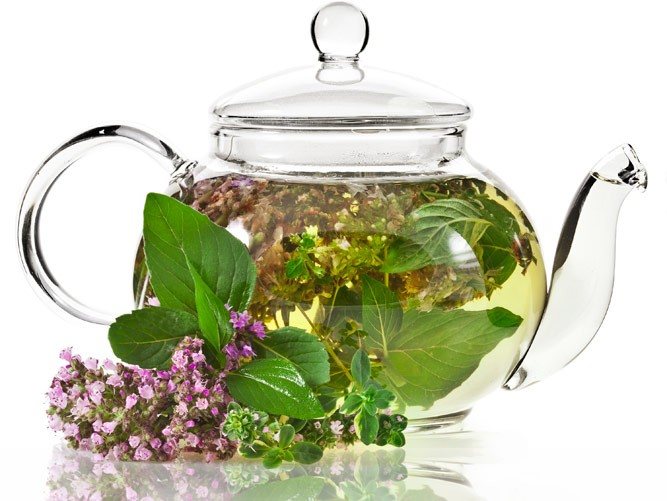
Photo: depositphotos.com. Author: Madlen.
If your doctor has approved taking the herb, be sure to check with him about the permissible dosage. When breastfeeding, limit yourself to one mug of weakly brewed drink per day.
Black tea
- 3 tbsp. l. Ceylon tea;
- 1 tsp. thyme;
- 300 ml boiling water.
Brew tea as usual, but add thyme leaves to the brew. It will calm your nerves, relieve ailments, and help you cope with colds. The taste of the drink will be decorated with: honey, viburnum or cranberries, mint.
Herb tea
- 2 tsp. dry grass;
- 500 ml water.
Cooking methods:
- brew in a regular teapot;
- keep the saucepan with thyme and water on the fire for several minutes;
- insist in a thermos.
Taste shades differ with different brewing methods, but this does not affect the key beneficial properties.
Feel free to combine the plant with green, red, white or black tea. Other good combinations:
- rose hip;
- Melissa;
- mint;
- honey;
- viburnum;
- Rowan;
- lemon;
- black currant;
- carnation;
- nettle.
Thyme can improve the condition of your hair and skin. To do this, a decoction of thyme is added to the bath. The method is suitable for combating insomnia and nervousness.
Is it possible for breastfeeding women to have tea with lemon?
What is beneficial in tea with the addition of thyme and should a woman who is breastfeeding drink it?
Thyme, or thyme, as it is often called, is a fairly well-known plant. First of all, this is due to its area of application; in medicine, thyme is added to cough medicines. But thyme is not only famous for this; its beneficial properties are very diverse.
If, for example, during gestation thyme is strictly contraindicated, then after childbirth it is considered permitted for use.
In general, its use during lactation is very safe. The only thing worth paying attention to is that thyme, like any other plant, can provoke an allergic reaction in a newborn or digestive problems.
Among the beneficial qualities of the plant are:
- Effect on blood pressure. Thyme reduces the frequency of contractions of the heart muscle, which causes the pressure level to decrease and the entire load on the cardiac system as a whole to decrease. Consequently, diseases of the cardiovascular system occur much less frequently.
- Therapeutic effect in the fight against cough. Thyme cleanses the bronchi and removes mucus, so tea with thyme during breastfeeding helps a nursing woman recover quickly from colds and prevents the development of complications.
- The plant contains vitamin C. In addition to strengthening the immune system, it has a beneficial effect on the overall health of both mother and baby. It protects the body from possible diseases, and when they appear, it helps to quickly eliminate the first symptoms.
- The antiseptic effect that the plant has due to the chemical elements it contains. When consumed, the infection inside the body is destroyed and all harmful substances are eliminated.
- High rate of effectiveness in the fight against helminths.
- Restores the nervous system, fights the signs of postpartum depression, which is often found in women giving birth. Helps cope with stress, normalizes sleep, restores the nervous system and improves the mood of a nursing mother.
- Restores healthy appetite. After childbirth, young mothers often experience complete apathy, including food. Tea with the addition of thyme not only stimulates appetite, but also has a beneficial effect on the functioning of the entire gastrointestinal tract, which is why foods are digested and absorbed much easier and faster.
- Affects milk production. Warm, copious drinks with thyme and other lactogenic agents stimulate lactation. And in addition to increasing production, the plant saturates the composition of breast milk with useful substances.
Method of preparing the drink
A drink made from thyme (it can also be called tea) is prepared as follows. For approximately 1 liter of boiled water you will need a tablespoon of mint and oregano, 4 tablespoons of thyme. Pour liquid over all components and let sit for several hours, or overnight.
Such drinks can also be prepared from other herbs, for example, instead of oregano and mint, take St. John's wort, linden, rose hips, and leave the thyme. It turns out to be a completely different taste and will not have time to become boring when you take it one at a time. Herbal teas with the addition of thyme can be taken in any form - both chilled and hot. So lovers of both drinks will be satisfied.
It is also possible to prepare regular black tea with a small piece of thyme. This recipe is suitable for lovers of black tea, and not for those who take herbal infusions, because adding thyme to the main tea and brewing only from herbs alone gives completely different tastes. Therefore, depending on your preference and taste, you can choose the most suitable and tasty brewing recipe for yourself. Follow the instructions for use or ask at the pharmacy, and also listen to the doctor’s recommendations, then nothing will threaten you or your child.
Tea with thyme for nursing mothers
Nursing mothers should drink tea with thyme with great caution. You should not start using it in the first two weeks after the baby is born. Then you need to focus on the basic rules for introducing a new product into the diet, familiar to every woman: in small portions in the morning, sensitively listening to your body and carefully observing the baby’s reaction to the new drink. Do not forget that essential oils have a pungent odor and change the taste of breast milk, which the baby may not like and will cause him to refuse to breastfeed.
It is better, of course, to discuss the permissible daily dosage of thyme with your doctor . In any case, you need to start with a few sips, gradually increasing your consumption to a small cup. It is brewed very simply - rules for preparing tea leaves:
- Rinse the teapot with hot water.
- Pour three teaspoons of black tea into it.
- Add one teaspoon of thyme.
- Pour boiling water (300 ml).
- Let it brew for one and a half minutes.
You can enjoy a pleasant drink.
For those who do not drink black tea, you can offer a herbal infusion. Two teaspoons of thyme are poured with hot (not boiling) water (500 ml) and infused in a thermos (about an hour) or in a water bath (five to ten minutes).
The taste differs slightly with different brewing methods, but the beneficial qualities remain unchanged.
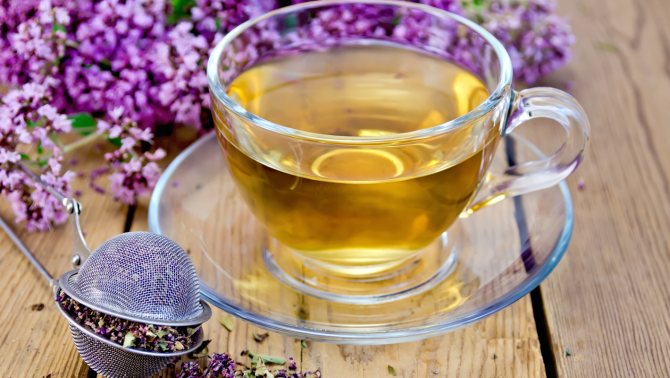
Thyme tea is easy to make and delicious to drink.
Video: tea with thyme and lactation
https://youtube.com/watch?v=ig4zkCbbwHM


